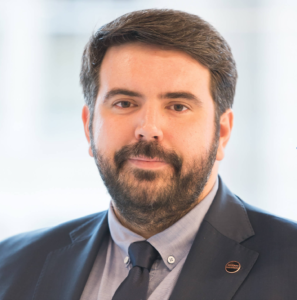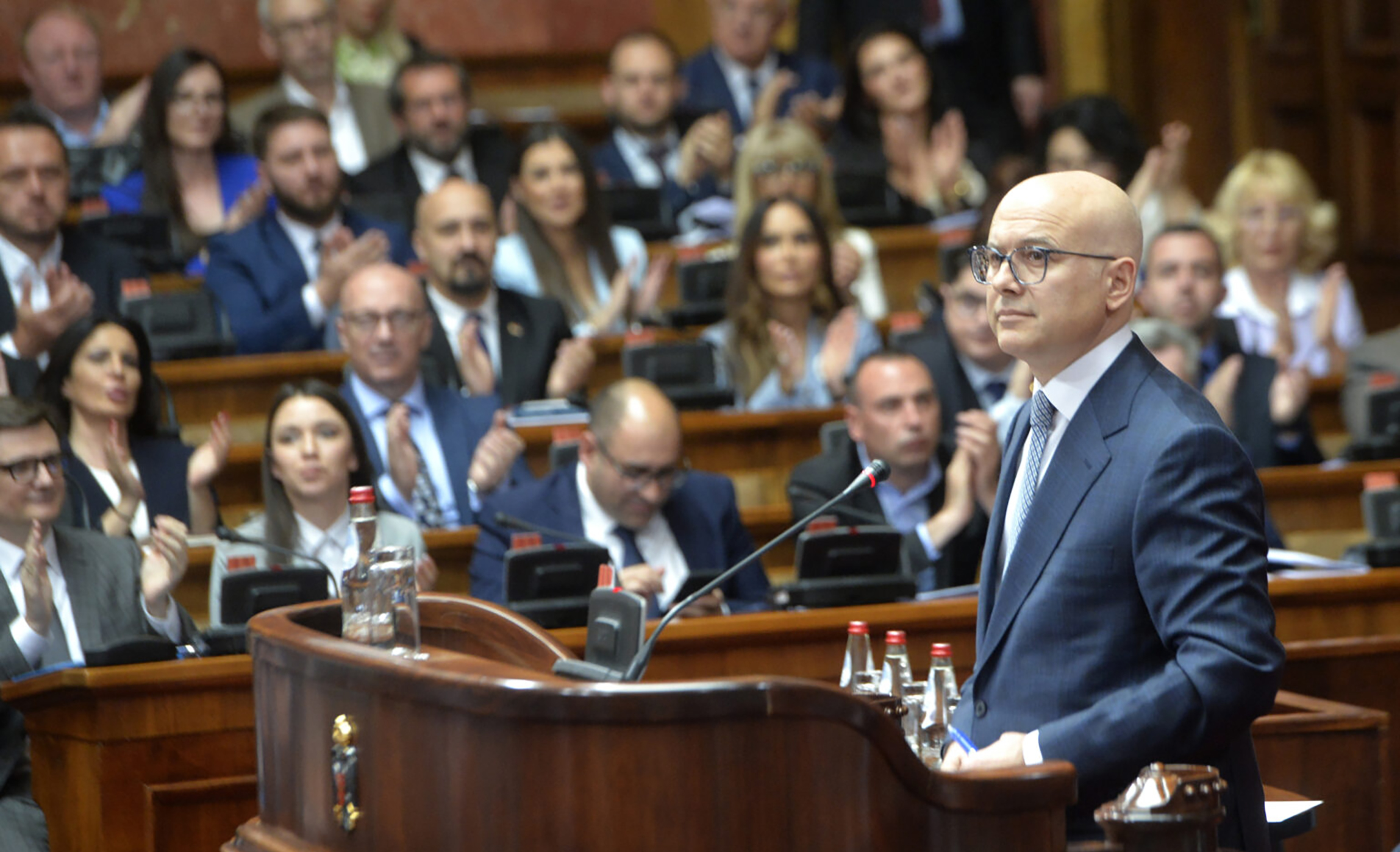The Serbian Parliament ratified the country’s new government led by Miloš Vučević, formerly the Minister of Defense. In his inaugural address to Parliament, Mr. Vučević emphasized the importance of fostering strong ties with China, Russia, and the US, in that order. He reaffirmed Serbia’s commitment to the territorial integrity of Ukraine and underscored the principles of political independence and military neutrality as foundational to Serbian foreign policy. Regional cooperation and peace were highlighted as essential for progress.
While Vučević’s speech appeared reassuring, closer scrutiny of his cabinet appointments suggests a continuation of his previous nationalist inclinations, particularly regarding a “Serbian world” agenda. Notably, the presence of nationalist figures and individuals with ties to Kremlin influence dominates the roster:
Prime Minister – Miloš Vučević
Minister of Foreign Affairs and Deputy Prime Minister – Marko Đurić
Minister of Defense – Bratislav Gašić
First Deputy Prime Minister and Minister of Finance – Siniša Mali
Minister of Internal and Foreign Trade – Tomislav Momirović
Minister of Economy – Adrijana Mesarović
Minister of Agriculture, Forestry, and Water Management – Aleksandar Martinović
Deputy Prime Minister and Minister of Environmental Protection – Irena Vujović
Minister of Construction, Transport, and Infrastructure – Goran Vesić
Minister of Mining and Energy – Dubravka Đedović Handanović
Minister of Justice – Maja Popović
Minister of Public Administration and Local Self-Government – Jelena Žarić Kovačević
Minister of Human and Minority Rights and Social Dialogue – Tomislav Žigmanov
Deputy Prime Minister and Minister of Internal Affairs – Ivica Dačić
Minister of Education – Slavica Đukić Dejanović
Minister of Science, Innovation, and Technological Development – Jelena Begović
Minister of Health – Zlatibor Lončar
Minister of Labor, Veterans, and Social Affairs – Nemanja Starović
Minister for Family Care and Demography – Milica Đurđević Stamenkovski
Minister of Tourism and Youth – Husein Memić
Minister of Culture – Nikola Selaković
Minister for Rural Development – Milan Krkobabić
Minister of Sports – Zoran Gajić
Minister of Information and Telecommunications – Dejan Ristić
Minister of Public Investments – Darko Glišić
Minister for European Integration – Tanja Miščević
Deputy Prime Minister – Aleksandar Vulin
Ministers without Portfolio: Novica Tončev, Đorđe Milićević, Usame Zukorlić, Nenad Popović, Tatjana Macura.
The initial reactions emerged due to the perceived influence of what is referred to as the “Russian element” in some of the ministerial appointments. The United States Department of State officially expressed disappointment at seeing two individuals under U.S. sanctions proposed for positions in the new government.
Aleksandar Vulin, nominated for Deputy Prime Minister, and Nenad Popović, nominated for Minister without Portfolio, fall under this category. Vulin, a former youth leader of Slobodan Milošević wife’s party, has shifted his image from a long-haired anti-western tanky to an extremely conservative machoist Russian proxy in recent years. Concerns about Vulin’s involvement in transnational organized crime, illegal narcotics operations, and abuse of public office have been raised, as outlined in a statement from the U.S. Office of Foreign Assets Control. However, it’s understood that Vulin is not autonomous in his actions; his closeness to Russian services seems more of a delegated role than an independent initiative.
Furthermore, the return of Ivica Dačić, President of Milošević’s Socialist Party and a coalition partner of Vučić, to the position of Minister of Internal Affairs adds another layer of Russian influence, adding to the complexity and diversity of Russian influence over Serbian politics. Dačić’s party has been delegated to provide logistical and political support for Russian investments in the energy sector in Serbia, notably, Gazprom and its monopoly in Serbia’s gas and petrol industry.
Bratislav Gašić, who already headed the Ministry of Defense, and resigned due to inappropriate behavior towards a female journalist back in 2015, is reinstated to the same position again. Since that, Gašić has headed the country’s intelligence.
Marko Đurić, returning from his position as ambassador to Washington, will become the Minister of Foreign Affairs. Đurić has a history of student leadership, including leading protests in Belgrade that resulted in the burning of the U.S. Embassy back in 2008. Đurić has been cultivating connections between the Serbian administration and conservative Trump supporters in Washington in recent years, but he has also demonstrated unusual diplomatic skill in promoting Serbian nationalist interests among progressive American officials too.
Zlatibor Lončar, a former personal physician associated with a notorious Serbian Zemun narcotics cartel, will take charge as the Minister of Health.
Milica Đurđević Stamenkovski, leader of the Zavetnici party, known for its extreme pro-Russian stance, will oversee the Ministry for Family Care and Demography.
Đurđević Stamenkovski actively participated in Russian information influence campaigns in Serbia, traveling to the events and gatherings of international pro-Putin youth. To add to this Russian-inspired “Moralist International” presence in the Serbian government, it is important to mention that both Prime Minister Vučević and Deputy Prime Minister Vulin were some of the most articulate promoters of the Serbian world idea in the Balkans, causing strong reactions from Serbia’s neighbors.
This narrative, rooted in the concept of the “Russian world,” aims to consolidate Serbian and Russian interests under a shared ideology of Orthodox Christianity, autocracy, and nationalism. The setup of the new cabinet underscores President Vučić’s continued commitment to the Serbian world concept as a priority in the Serbian regional nationalist agenda.
The new cabinet’s composition suggests a continuation of Serbia’s assertive stance in the region, raising fears of heightened ethnic tensions and potential challenges. This is a major concerning aspect of the new government, as it bears the potential for increased Serbian influence over parts of Bosnia and Kosovo, where Serbian minority populations reside. Moreover, within the ruling coalition in Montenegro, Serbia’s influence has been an important issue since 2020. The formation of the new government may embolden pro-Serbian factions within Montenegro, leading to heightened political polarization and undermining Montenegrin efforts towards integration into the EU.
Overall, Serbia’s new government demonstrates a clear continuation of a pro-Russian and anti-Western policy. The question remains as to why Western trust in Vučić persists despite all of this.
Russia, keen on maintaining its influence in the Balkans and diverting attention from its military actions in Ukraine, may exploit the composition of Serbia’s new cabinet to sow seeds of regional instability. Moscow has a track record of leveraging political alliances and fostering divisions within neighboring countries to advance its geopolitical objectives. The close ties between certain members of the Serbian government and Russian interests provide Russia with avenues to exert influence and undermine Western initiatives in the region. By supporting nationalist sentiments and fueling ethnic divisions, Russia could be emboldened to further destabilize the Western Balkans and assert itself as a key player in the region’s affairs.
With municipal elections in sight in the capital Belgrade, Serbia’s opposition faces an uphill battle against Vučić’s autocratic rule, highlighting the challenges to democratic governance in the country.
When it comes to internal politics, the cabinet composition tells us that Vučić is planning to make a stronger grip on the security and intelligence apparatus. No signs that there will be efforts to tackle the problem of corruption and organized crime. Lack of media plurality and pressures on civil society continue. According to all relevant global polls and reports the state of democracy and freedom in the country is on a downward trajectory.
The articles published in the “Opinions” column reflect the personal opinion of the author and may not coincide with the position of the Center
Ljubomir Filipović. Montenegrin political scientist



